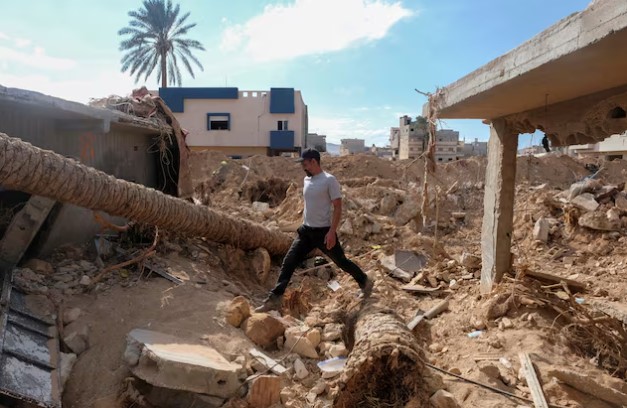Libyan court jails 12 officials over deadly floods

Thousands were killed and thousands more were missing as a result of the floods that burst dams, swept away buildings and destroyed entire neighbourhoods.
A Libyan court has jailed 12 officials in connection with the collapse of a series of dams in Derna last year that killed thousands of the city's residents, the Attorney General said on Sunday.
The officials, who were responsible for managing the country's dams, were sentenced to between 9 and 27 years in prison by the Court of Appeal in Derna. Four officials were acquitted.
More To Read
- Southeast Asia faces catastrophic floods as tropical storm kills 600 hundred
- More than 1,000 migrants drown in Mediterranean so far this year, IOM says
- Garissa town residents call for urgent drainage fix as floodwaters swamp businesses, homes
- MPs link deforestation to deadly landslides, call for stronger disaster preparedness plans
- Officials warn of child safety risks near Ngong River in Mukuru
- Update: 15 dead after massive landslide in Elgeyo Marakwet County following heavy rains
Derna, a coastal city with a population of 125,000, was devastated last September by massive floods caused by Storm Daniel.
Thousands were killed and thousands more were missing as a result of the floods that burst dams, swept away buildings and destroyed entire neighbourhoods.
The Attorney General in Tripoli said three of the defendants were ordered to "return money obtained from illicit gains", according to a statement, which did not give the names or positions of those on trial.
"The convicted officials have been charged with negligence, premeditated murder and waste of public money," a judicial source in Derna told Reuters by phone, adding that they had the right to appeal against the verdicts.
A report in January by the World Bank, United Nations and European Union said deadly flash flooding in Derna constituted a climate and environmental catastrophe that required $1.8 billion to fund reconstruction and recovery.
The report said the dams' collapse was partly due to their design, based on outdated hydrological information, and partly a result of poor maintenance and governance problems during more than a decade of conflict in Libya.
Libya has been split since 2014 between rival power centres ruling in east and west following the toppling of Muammar Gaddafi in a NATO-backed uprising in 2011.
Other Topics To Read
Top Stories Today













































